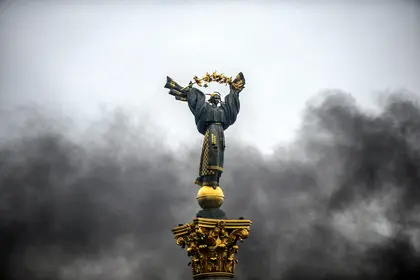Geopolitical predictions are vital, but we can’t lose sight of ourselves as people who have changed dramatically since February 24, 2022. I’ve decided to reflect on how I’ve changed since the start of the war. I recommend you do the same. You’ll see that honest self-reflection is surprisingly cathartic and liberating.
The initial shock
JOIN US ON TELEGRAM
Follow our coverage of the war on the @Kyivpost_official.
For years, Ukraine wasn’t really a topic of interest for Poles. We were looking to the West for guidance and inspiration. We were bewitched by the U.S. The myth of a rich American uncle visiting his Polish family to leave a nice sum of money persisted in the Polish psyche for years. Our attention briefly turned to Ukraine in 2014. We then looked to the West again.
The situation changed completely on February 24. I woke up and glanced at my smartphone. The CNN headline screamed RUSSIA INVADES UKRAINE. At that point, I knew the world was never going to be the same. I wasn’t going to be the same. The world of relative stability, governed by international laws I had studied so diligently, was gone. The world was devolving into a medieval mess.
War isn’t a Netflix show. Genocide isn’t a Netflix show. Just ask Ukrainian refugees who don’t need Netflix shows to know the horrors of war.
Ukrainian refugees arrive in Warsaw
When Ukrainian refugees arrived at Warsaw Central Railway Station, the war was no longer an abstract concept. My Japanese acquaintance was quick to act. He wanted to help as much as he could. I was hoping the Ukrainian children would benefit from the Polish education system as much as possible. I taught English to Ukrainians in 2018. They were great students who understood the value of education. I practiced my Russian with them. I definitely wouldn’t practice Russian with them now.

Zelensky Meets CIA Director William Burns in Ukraine
I’ve recently learned that language nuances are important in times of war and genocide. I no longer use “spasiba” (Russian for “thank you”) when talking to Ukrainians. I use “dyakuyu” (“thank you” in Ukrainian) instead. “Dyakuyu” sounds similar to the Polish world “dziekuje”. Even the pronunciation is similar. Easy to remember for a Polish speaker like me. In Polish, someone who shows chutzpah is called a kozak (cossack).
The Russians tried to demonize Ukrainian refugees. They said the refugees were a threat to Polish national security. A fake photo of a Ukrainian who was fleeing the war disguised as a woman was circulating online. How should Russian men fleeing Putin’s general mobilization be called, then? Z-eunuchs aka Z-nuchs? Maybe a Georgian girls choir is going to find a spot or two for them.
I used to think you can reason with Russians. I should have known better.
Relationship with Russians
On February 24, my relationship with Russians changed dramatically. I’ve made a decision to cut contact with them. I know their way of thinking pretty well. When I studied international relations in Warsaw, there were several Russians in my group. They had a problem with Ukraine even in 2013. Clearly, they weren’t some stupid Russians who had no idea about the world. They were smart people who could have a deep conversation with you.
When you wanted to see a complete change in their attitude, you just needed to mention independent Ukraine. It was like waving a magic wand or watching a demonic possession in real time. Smart and cultured Russian students turned into Kremlin propagandists obsessed with making Russia proud. It wasn’t a performance. They had been brainwashed. Their Ukrainian obsession bordered on mental illness. Then again, their Polish obsession was just as unhealthy.
Some say we can’t paint all Russians with the same brush. But isn’t painting all Ukrainians as Nazis exactly what the Russians are doing? I’ve talked to many Russians over the years and they all seem to share the same obsessions. They project these obsessions onto Putin. Sure, there are non-imperialist Russians, but they are so rare it’s like winning the lottery when you meet one.
Russians see themselves as parents and their former spheres of influence as children who need to be liberated from the clutches of Western imperialism and guided back to the motherland. If that’s not twisted thinking, I don’t know what is. Speaking of imperialism, let’s not forget about the source of Russian pride: the biggest nuclear weapons arsenal in the world.
The nukes and my place in the universe
The surreal threat of a Russian nuclear strike on Ukraine scares me. I’ve coined a term describing the feeling of imprisonment on a planet in crisis. I call that feeling the planetary entrapment syndrome. I’m inclined to ask questions about my place in the universe. My relationship with God, if you will. The grand scheme of things is what matters to me now. Climbing the illusory career ladder or taking part in the rat race with a bunch of psychopaths no longer sound like fun. I don’t know what the future holds, but my sense of this world’s ephemerality is now stronger than ever. The Ukraine war has, in a Shakespearean twist, helped me to gain a healthy perspective on life.
The views expressed in this article are the author’s and not necessarily those of the Kyiv Post.
You can also highlight the text and press Ctrl + Enter






